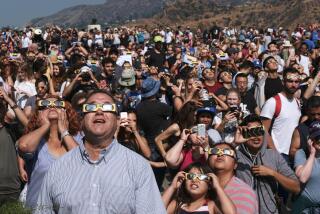Solstice Marks the Start of Winter
- Share via
Winter officially begins tonight.
The winter solstice arrives in Los Angeles at 11:04 p.m., making this officially the longest night of the year.
For the record:
12:00 a.m. Dec. 22, 2003 For The Record
Los Angeles Times Monday December 22, 2003 Home Edition Main News Part A Page 2 National Desk 0 inches; 28 words Type of Material: Correction
Winter solstice -- An article in Saturday’s Section A said winter arrived in Los Angeles at 11:04 p.m. Saturday. The winter solstice was, in fact, 11:04 p.m. Sunday.
But that does not mean that either the latest sunrise or the earliest sunset occurs tonight. In fact, the earliest sunsets of the year occurred from Nov. 27 to Dec. 12 at 4:44 p.m., said astronomer Patrick So of the Griffith Observatory. The latest sunrises will occur from Jan. 5 to Jan. 10 at 7 a.m., he said.
A host of factors account for these differences, but the most important are small changes in Earth’s orbital speed: Earth speeds up as we get closer to the sun and slows down as we get farther away. The net effect is that the time from local high noon to local high noon at any site is not exactly 24 hours, but may be a few minutes more or less, depending on where the Earth is in its orbit.
The difference is cumulative. At the beginning of November, the sun is about 16.25 minutes behind an accurate clock, so that noon, as measured by a sundial, actually occurs at 12:16 p.m. By mid-February, solar time has outpaced humanity’s clocks by about 14 minutes, so the sun is at its apex at about 11:46 a.m.
More to Read
Sign up for Essential California
The most important California stories and recommendations in your inbox every morning.
You may occasionally receive promotional content from the Los Angeles Times.













